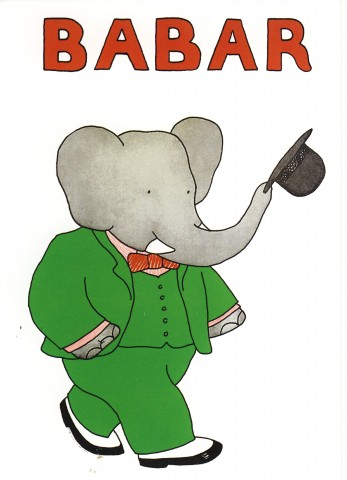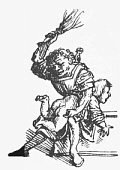I finally finished the B section of Brewer’s Dictionary of Phrase and Fable! It’s okay that it took me a little while–B is the third longest chapter, after C and S. I guess theoretically this means I’m 1/13 (about 8%) of the way through this project, but really it’s more like 14% if you’re actually counting page numbers. You can’t really compare X (2 pages) and C (127 pages) and say that they’re both 1/26 of the whole.
Anyway, here are the best things I read about that start with B:
Babar. The elegantly dressed African elephant in the books for young children by the French writer and illustrator Jean de Brunhoff … His name, perversely enough, appears to derive from Hindi babar, ‘lion’.
Remember the rule that if the Professor is more than 10 minutes late, you can leave class? There’s definitely a better way:
Barring out. In former days, a schoolboys’ practice of barricading masters out of the classroom or the school. In 1818 soldiers were called in to deal with a rebellious outbreak at Winchester College.
Someone really didn’t want to take a midterm, I guess.
Bark. Dogs in their wild state never bark, but howl, whine, and growl. Barking is an acquired habit.
I really wish my neighbor’s dog hadn’t acquired this habit, at least at 7 in the morning.
To beat the bounds.An old custom … of going around the parish boundaries on Ascension Day. The schoolchildren, accompanied by the clergyman and parish officers, walk round the boundaries, which the boys ‘beat’ with peeled willow-wands. The boys were originally themselves sometimes beaten at the limits of the boundaries to make them remember the place.
Belle laide. (French, ‘beautiful ugly one’) An intriguingly unattractive woman.
Also sometimes you learn supposedly American slang you’ve never heard before:
Booby hatch. An American slang expression for a psychiatric hospital.
Or the strange origins of common words:
Bully. The original meaning of the noun was “sweetheart” as in:
“I kiss his dirty shoe, and from my heart-strings
I love the lovely bully.”
Shakespeare: Henry V, IV, i (1598)Its origin is probably in Middle Dutch boele, ‘lover’. The sense development seems to have gone as follows: (1) lover, (2) fine fellow, (3) blusterer, (4) bully.
C is probably going to take me awhile! It’s the longest chapter in the book!


I have a CD of “The History of Babar,” a French piece of classical music that tells the story of Babar and introduces kids to classical. It’s like their version of “Peter and the Wolf”.